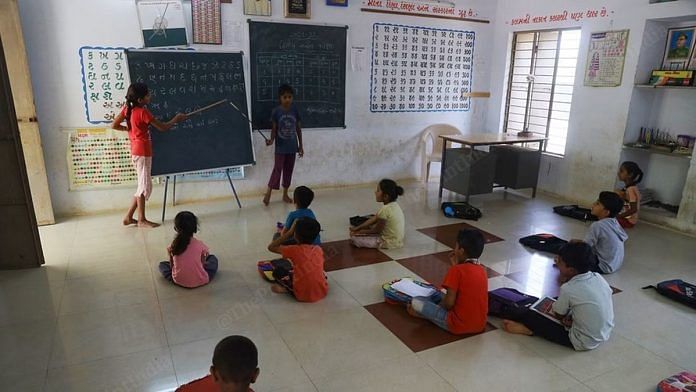New Delhi: The Ministry of Education has asked all states and districts to ensure that children in the age group of three to eight years are enrolled in schools and have access to basic facilities.
A letter was sent to all stakeholders last week, as part of the implementation of the government’s foundational literacy and numeracy initiative —National Initiative for Proficiency in Reading with Understanding and Numeracy (NIPUN Bharat).
NIPUN Bharat gains relevance in the context of the New Education Policy (NEP) 2020 which accords the “highest priority of the education system, to achieve universal foundational literacy and numeracy in primary school by 2025”.
As part of the initiative, the ministry has also devised a five-stage plan to ensure that children attain a certain level of education at the foundational stage in schools across states. The letter sent out by the ministry details the five-stage plan and asks states to follow it to ensure the implementation of the NIPUN Bharat initiative.
“The goal of the mission is to create an enabling environment for ensuring the universal acquisition of foundational literacy and numeracy among all children. The Mission is a critical and time-bound initiative of the Ministry of Education (MoE),” read the letter, adding that states should follow the five-tier plan. ThePrint has a copy of the letter.
The five-tier plan includes collaborative efforts at five levels — National Mission, State Mission, District Mission, Block/Cluster Level Mission and School and Community.
Role of each stakeholder
The plan charts out the responsibilities of each of the stakeholders.
At the national level, for instance, the Central Board of Secondary Education (CBSE), which is one of the stakeholders, has been asked to introduce competency-based education in its affiliated schools and work with the National Council of Educational Research and Training (NCERT)to develop codification and matrix for learning outcomes for the primary level.
The CBSE has also been asked to encourage the usage of Vidya Pravesh (an NCERT module that uses play-based methods for learning) in CBSE schools. Kendriya Vidyalayas have also been asked to introduce competency-based education and start Balvatikas (pre-school level classes).
Stakeholders have further been tasked with ensuring the implementation of the initiative using funds available at the district and state levels. Districts have also been asked to ensure the availability of books and uniforms to children in a timely manner.
Besides engaging parents and the community in the learning process, schools have been asked to “create an enabling environment in the classroom/school for the implementation of curriculum, pedagogy and assessment”.
Parents, meanwhile, have been asked to ensure that all children in the age group of three to eight years — the foundational learning stage — should be in school. Parents should also understand their role in the learning of the child and how they can support the child at home with various activities including digital learning in synchronisation with the school, said the letter.
It further suggested that parents should periodically interact with school and teachers to understand the child’s progress and ensure a conducive learning environment at home.
(Edited by Amrtansh Arora)
Also Read: Covid upheaval not the only reason: Why homeschooling is taking off in India



